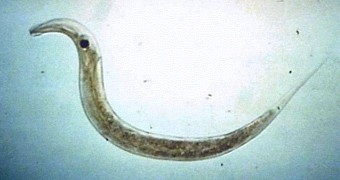A recent paper in the journal Parasites & Vectors announces the discovery of an ancient parasite egg in a teeny tiny piece of fossilized dung.
The egg, found by University of Nebraska-Lincoln specialist Scott Gardner and fellow researchers, is said to be 240 million years old.
Parasitologist Scott Gardner explains that the fossilized poo from which the egg was pulled was discovered back in 2007 while excavating an archaeological site in Brazil.
The fossilized dung was left behind by herbivorous cynodonts, i.e. a group of animals considered to be the ancestors of mammals.
The egg, on the other hand, belongs to a previously undocumented pinworm species. The species is now known as Paleoxyuris cockburni.
Scott Gardner says that, given the discovery of this pinworm egg in fossilized cynodont poo, it's pretty clear that these plant-eating animals were no strangers to parasites.
What's more, it could be that herbivorous dinosaurs that used to feast on massive amounts of plant material carried pinworms in their bodies as well.
“This discovery represents a first for our team and I think it opens the door to finding additional parasites in other species of fossil organisms,” University of Nebraska-Lincoln parasitologist Scott Gardner commented on this find.
Admittedly, finding a 240-million-year-old parasite egg in a piece of fossilized dung is nothing short of impressive. More so given the fact that, as mentioned, the egg is no bigger than a grain of sand.
Still, it's important to note that, since paleoparasitology emerged as a self-standing science, researchers have managed to pin down plant and animal parasites that populated the Earth an impressive 500 million years ago.

 14 DAY TRIAL //
14 DAY TRIAL // 



